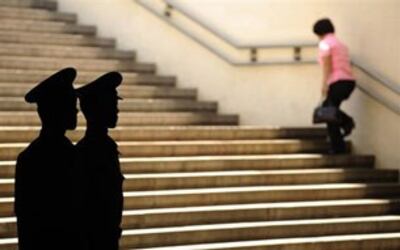HONG KONG—Chinese authorities have tightened Internet controls and sharply stepped up surveillance on the eve of the 20th anniversary of the deadly June 4, 1989 crackdown on pro-democracy protests around Tiananmen Square.
In Beijing, security forces blanketed the square and black police vans lurked alongside the nearby Forbidden City, as police and paramilitary forces patrolled through crowds of tourists.
Administrators at Chinese universities have been told to keep a close eye on foreigners in their departments. Taxi drivers were instructed to watch out for suspicious passengers, especially those headed toward the square.
Authorities have also blocked Twitter, Hotmail, You Tube, blogs, and the photo-sharing site Flickr, expanding an already tough firewall aimed at suppressing any online mention of the night June 3-4, 1989 when Chinese troops opened fire on unarmed protesters, killing hundreds and prompting an international outcry.
...We have nothing..."
1989 dissident Chen Longde
And despite few signs of any commemoration inside China that the government might find threatening, authorities also denied entry to the second most-wanted 1989 student leader, Wu'er Kaixi, to the southern Chinese territory of Macau.
Wu’er traveled to Macau on Wednesday to turn himself in to authorities in a bid to return home but immigration officers at the Macau airport pulled him aside and demanded he fly back to Taiwan.
Some Beijing residents said the government’s blackout on any mention of the crackdown had been so thorough that universities hadn’t bothered to warn students against commemorating it.
...When I got home my phone line was cut off and I couldn't get on the Internet either."<br/>Guizhou dissident Wu Yuqin<br/>
“Nowadays the students even don’t know what ‘June 4’ signifies. The school doesn’t mention this at all. We never saw any books about the incident,” one college professor said.
But Beijing-based writer Jiang Qisheng said he believed the firewall on June 4, 1989 would eventually crumble.
“At the present, the college students know neither Zhao Ziyang nor Hu Yaobang, the two late Party chiefs related to the Tiananmen crackdown,” Jiang said.
“The Chinese authorities are trying to cover it all up, but it’s impossible to hide the facts forever. People were killed on major thoroughfares with tanks and machine guns. Once the students understand the truth, they will despise the authorities,” he said.
Dissidents harassed

Meanwhile, hundreds of petitioners—ordinary citizens who travel to Beijing to seek redress for official wrongdoing—rallied Tuesday outside the Chinese Supreme Court, holding a sign with the words “Auditorium to Voice Grievances.”
The petitioners took turns describing their grievances, and one cited plans to commemorate the crackdown.
In the southern commercial hub of Shenzhen, police warned rights activist Guo Yongfeng to keep quiet.
“The police from my residence district took down my phone number and asked me not to write or do anything in the coming days,” he said, adding that they appeared to be targeting in particular leading local dissident Zhao Dagong.
Zhao was a signatory to Charter 08, a bold petition calling for democracy and signed last year by more than 300 Chinese intellectuals, human rights lawyers, and dissidents.
“They threatened Zhao Dagong with a jail term of four to five years if he does anything marking June 4,” Guo added.
Another Shenzhen activist, Yang Yong, was warned in May against returning home from a visit to Nanchang, the capital of Jiangxi province.
“They said if I went back to Shenzhen, they would ask the Jiangxi province police to take me back to Nanchang,” Yang said.
Symposium moved
Police last week blocked a dissident symposium on human rights in southwestern Guizhou province, but participants instead had a private meeting in the provincial capital, Guiyang, on Monday.
One participant, Wu Yuqin, said she was detained shortly afterward. “They forced me into a car and I quarreled with them in the police station,” she said.
“I insisted that commemorating June 4 is a decent and justified activity, and then they released me. However, when I got home my phone line was cut off and I couldn’t get on the Internet either,” she said.
Open letter
In Chengdu, capital of southwestern Sichuan province, police detained four dissidents Tuesday for planning a commemoration.
In the southern Chinese province of Zhejiang, five dissidents published an open letter to the Chinese leadership on Saturday, calling for an end to economic discrimination against dissidents who were jailed because of their part in the 1989 movement.
Only an hour after the on-line petition was posted, police took Wu Gaoxing, who signed it, from his home in Linhai city.
“My husband was transferred from the police to the local residence committee. They say he is fine and will be home after several days,” his wife said.
Chen Longde, disabled after a suicide attempt to protest prison beatings, also signed the letter.
In an interview, he said he and other 1989 dissidents had suffered unbearable discrimination.
“For the last 20 years, we have been deprived of the basic right to live. The Chinese government claims that now every Chinese gets a square meal, a residence, and a health care plan. But we have nothing,” Chen said.
Original reporting by Xin Yu, Yan Xiu, and Qiao Long for RFA’s Mandarin service. Translated by Chen Ping. Additional reporting by news agencies. Mandarin service director: Jennifer Chou. Edited in English by Sarah Jackson-Han.
